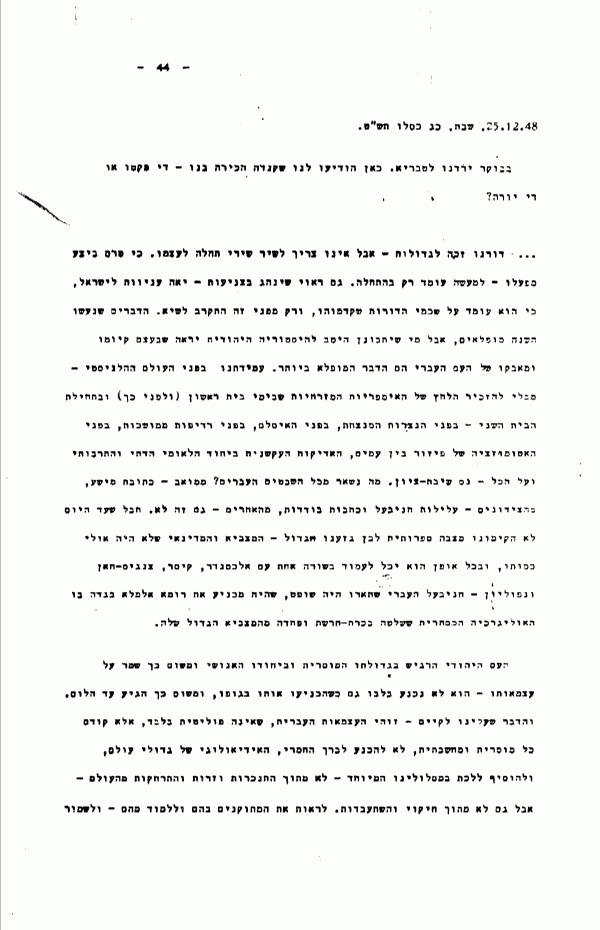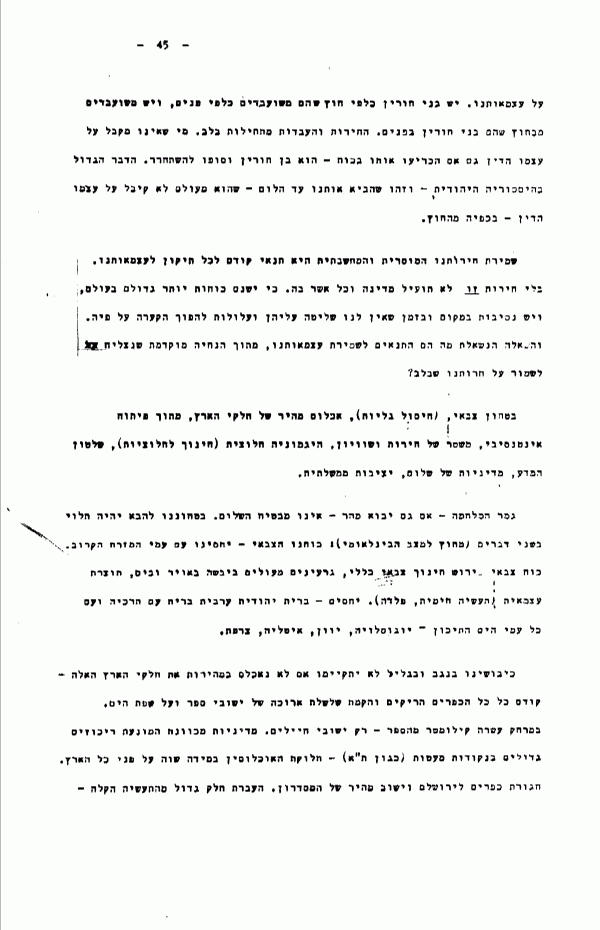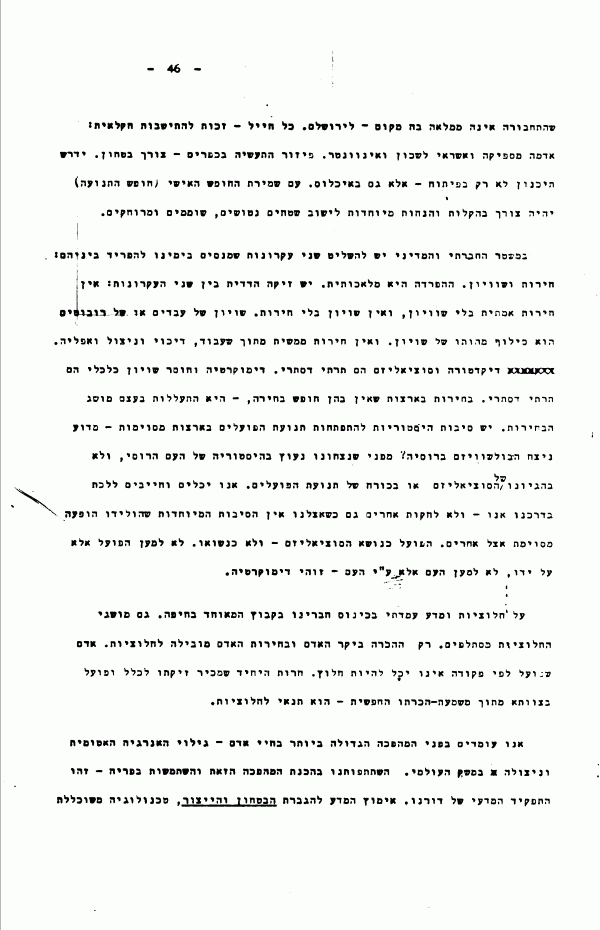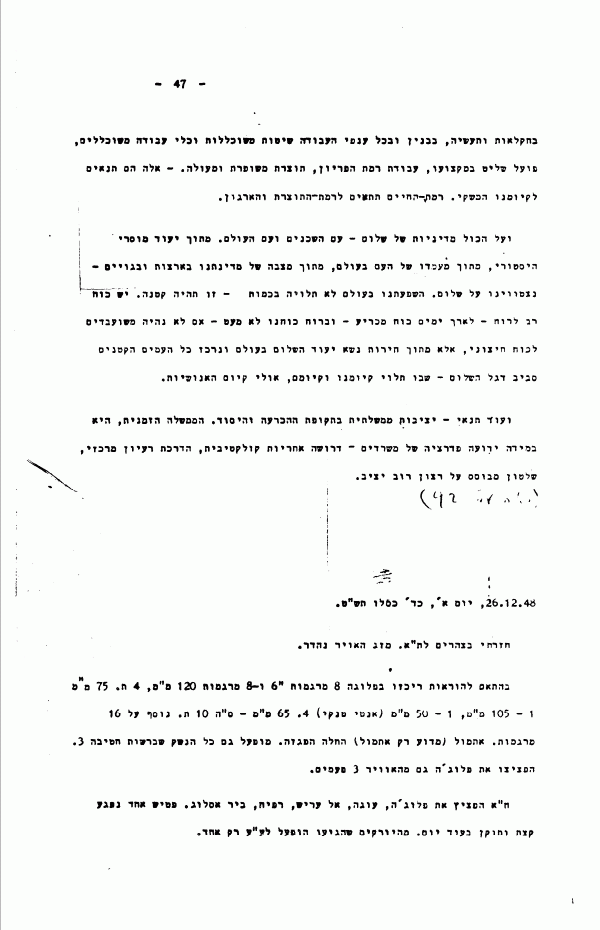1
of
Places:
Canada
France
Haifa
Tverya
Rome
Yugoslavia
Turkey
Jerusalem
The use of the photograph is subject to the Copyright Law, 2007
25.12.1948
223454
Saturday, December 25, 1948 In the morning we set out for Tiberias. Here we were informed that Canada had recognized us. De facto or de jure? [“Hanukkah Musings” (the heading Ben-Gurion later gave to the following remarks):] Our generation has achieved greatness – but should not sing songs of praise for itself, because it hasn’t yet completed its work – in fact it’s only at the starting point. It’s also appropriate that it conduct itself modestly – humility is befitting for Israel, because it stands on the shoulders of previous generations, and only for this reason has it approached greatness. The things achieved this year are wondrous, but anyone who looks closely at Jewish history will see that what is most wondrous is actually the existence and struggle of the Hebrew [Jewish] people. Our steadfastness in the face of the Hellenistic world – not to mention the pressure from Eastern empires in the days of the First Temple (and earlier) and the start of the Second Temple – in the face of victorious Christianity, in the face of Islam, in the face of continuous persecution, in the face of the atomization following from dispersion among the nations, the persistent allegiance, especially the national, religious, and cultural [allegiance], and above all – the miracle of the return to Zion. What remains of all of the Hebrew [Canaanite] tribes? From Moab – the Mesha Stele [Moabite Stone]; from the Sidonians – the tales of Hannibal and a few writings; from the others – not even that. It’s a pity that to date we still haven’t created a literary monument to that great member of our race – that military leader and statesman the likes of whom there may never have been, and who in any event can be counted along with Alexander, Caesar, Genghis Khan, and Napoleon –Hannibal [of Carthage] the Hebrew, whose title was that of Judge, who would have vanquished Rome, had he not been defeated by the merchant oligarchy that ruled Carthage and feared its own great military leader. The Jewish people had a sense of its moral, and especially humane, importance, and therefore preserved its independence – it did not surrender in its heart even when it was vanquished physically, and this is why it has reached this point. And the thing that we must uphold is Hebrew [Jewish] independence, which is not solely political, but first of all moral and intellectual, not to succumb to the material and ideological glitter of the world’s greats, but to continue following our unique path – not out of alienation or foreignness or detachment from the world, but not out of imitation and subservience either. To see the virtuous among them and learn from them – and to maintain our independence. There are outwardly free men who are inwardly enslaved, and there are outwardly enslaved who are internally free men. Freedom and enslavement start in the heart. Anyone who doesn’t accept the verdict, even if he was forcefully vanquished, is a free man and will ultimately be liberated. The greatness of Jewish history – which is what brought us to this point – is that [the Jewish people] never accepted the verdict that was imposed from outside. The preservation of our moral and intellectual freedom is a precondition for any modification of our independence. Without this freedom, there can be no utility from a state or its components. Because there are stronger forces in the world, and there are circumstances of space and time that we cannot control and that could turn things on their head. And the question that arises is: What are the conditions for the preservation of our independence, assuming a priori that we will succeed in preserving the freedom in our heart? Military security, (eliminating diasporas), rapid settlement of parts of the country, with intensive development, a governing system of liberty and equality, halutzi [Zionist pioneering] hegemony (education in halutziyut [the Zionist pioneering spirit]), the rule of science, a policy of peace, governmental stability [a stable governing system]. The end of the war – even if it comes quickly – doesn’t guarantee peace. Henceforth our security will depend on two things (aside from the international situation): our military strength [and] our relations with the nations of the Near East. Military strength means – general military education, excellent core units on land, air, and sea, independent production (chemical production, steel). Relations [mean] – a Jewish-Arab alliance, an alliance with Turkey and with all the nations of the Mediterranean Sea – Yugoslavia, Greece, Italy, France. Our conquest of the Negev and the Galilee won’t be sustained if we don’t rapidly populate these parts of the country – first of all the empty villages, and the establishment of a long chain of frontier and coastal settlements. Within a range of 10 km from the frontier – only settlements of soldiers. A deliberate policy of preventing large concentrations in a few locations (such as Tel Aviv) – equal distribution of the population throughout the country. A stretch of villages to Jerusalem and rapid settlement of the corridor [to Jerusalem]. Transferring a large portion of light industry – where transport doesn’t play a role – to Jerusalem. For each soldier – the right to agricultural settlement: sufficient land and credit for housing in the inventory [the buildings in an agricultural settlement]. The distribution of industry across villages – is a security need. Planning will be required not only for development – but also for settling residents, while maintaining individual freedom (freedom of movement). There will have to be special benefits and discounts for settling abandoned, desolate, and faraway areas. The social and governing system should implement two principles that these days people try to separate: liberty and equality. Their separation is artificial. There’s a reciprocity between the two principles: there’s no real liberty without equality, and no equality without liberty. Equality of slaves or of robots is a distortion of the very essence of equality. And there’s no real liberty out of enslavement, oppression, exploitation, and discrimination. Dictatorship and socialism are mutually contradictory. Democracy and economic inequality are mutually contradictory. Elections in countries that have no freedom of choice are an abuse of the very concept of elections. There are historical reasons for the development of a workers’ movement in certain countries – why was Bolshevism victorious in Russia? Because its victory is grounded in the history of the Russian people, not in the logic of socialism or the inevitability of a workers’ movement. We can and must follow our own path, and not imitate others, even when we don’t have the special circumstances that produced a certain outcome for others. The worker as the subject of socialism – not as its object. Not for the worker but by him, not for the people but by the people – this is democracy. As to halutziyut and science, I addressed these at the gathering of our members from HaKibbutz HaMeuchad [a kibbutz movement] in Haifa [on September 11]. The concepts of halutziyut also get distorted. Only recognition of the value of humanity and liberty of humanity lead to halutziyut. A person acting under orders cannot be a halutz [Zionist pioneer]. The liberty of the individual – who recognizes his bond with the collective and acts in tandem out of the discipline of his free consciousness – is a condition for halutziyut. We are facing the greatest revolution in the annals of humanity – the discovery of atomic energy and its exploitation for the global economy. Our participation in the fostering of this revolution and use of its fruits – this is the scientific role of our generation. The adoption of science for the sake of increasing security and production, sophisticated technology for agriculture and industry, for construction and for all the employment sectors, sophisticated methods and sophisticated work tools, the worker’s mastery of his vocation, productivity in work, improved and high quality products – these are the conditions for our economic sustainability. The standard of living will accord with the standard of production and organization. And above all a policy of peace – with our neighbors and the world. Out of a moral historical mission, out of the standing of the [Jewish] people around the world, out of the status of our state among countries and nations – we have been commanded to [seek] peace. Our influence on the world doesn’t depend on quantity – this will be small. There’s a lot of strength in spirit – over the course of time spirit is decisive. And in spirit our strength is significant – as long as we are not enslaved to an external strength but instead, acting out of liberty, we pursue the mission of peace in the world and gather all the small nations around the flag of peace, on which our existence and their existence, perhaps humanity’s existence, depend. And another condition – governmental stability during the period of decision and establishment. The provisional government is to a certain extent a federation of ministries. [We] need collective responsibility, a central guiding concept, [and] governance based on the will of a stable majority.












